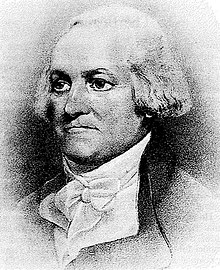“I have lamented excessively the Want of your Correspondence”
In his letter to Abigail Adams on 17 June 1775, which I started quoting yesterday, John Adams continued:
Three days later, he wrote directly to Tudor:
To begin with, this chiding wasn’t fair to William Tudor (1750–1819, shown here later in life), who was Adams’s former law clerk. All the other men were senior to Adams, so he couldn’t nag them the same way.
Furthermore, back in the fall of 1774, those older gentlemen had actually sent Adams rather few letters. Tudor had sent more than all the other men combined. He’d also traveled to Philadelphia himself, carrying the only letter that Cooper wrote to Adams in that season.
The first two men Adams named were Benjamin Kent (1708–1788) and Samuel Swift (1715–1775), senior figures in the Boston bar. Indeed, Kent had founded the bar association and liked to preside over its get-togethers. Each man had written Adams one letter in the fall of 1774, and Swift had sent another to the whole Massachusetts delegation. Neither wrote Adams in spring 1775.
As I said above, young Tudor had brought Adams a letter from the Rev. Dr. Samuel Cooper (1725–1783) in October 1774. That minister didn’t send anything in the spring of 1775.
Finally, no 1774 letters to Adams survive from Prof. John Winthrop (1714–1779) of Harvard College. But four days after Adams’s initial complaint on 17 June 1775, Winthrop did send him one. Tudor wrote a few days later. Both men described what had happened on the same date when Adams complained—namely, the Battle of Bunker Hill.
Because while Adams was aching to know how the war was going, all the men he wanted to hear from were actually living in the war zone. They had other things on their minds besides correspondence.
TOMORROW: Getting out of Boston, and getting news from Boston.
I have never been able to obtain from our Province, any regular and particular Intelligence since I left it. [Benjamin] Kent, [Samuel] Swift, [William] Tudor, Dr. [Samuel] Cooper, Dr. [John] Winthrop, and others wrote me often, last Fall—not a Line from them this Time.Adams was referring to his time away at the First Continental Congress in late 1774, when he felt well informed.
Three days later, he wrote directly to Tudor:
I have lamented excessively the Want of your Correspondence ever since I have been here. Not a Line from Dr. Winthrop, Dr. Cooper, Mr. Kent, Swift, Tudor, from some or other of whom I was accustomed the last Fall, to receive Letters every Week. I know not the state, the Number, the Officers of the Army—the Condition of the poor People of Boston or any Thing else.I decided to look into John Adams’s complaint, using the Adams Papers and Founders Online. He and his heirs were unusually conscientious about saving letters, so we’re at least very close to seeing all the correspondence he received.
To begin with, this chiding wasn’t fair to William Tudor (1750–1819, shown here later in life), who was Adams’s former law clerk. All the other men were senior to Adams, so he couldn’t nag them the same way.
Furthermore, back in the fall of 1774, those older gentlemen had actually sent Adams rather few letters. Tudor had sent more than all the other men combined. He’d also traveled to Philadelphia himself, carrying the only letter that Cooper wrote to Adams in that season.
The first two men Adams named were Benjamin Kent (1708–1788) and Samuel Swift (1715–1775), senior figures in the Boston bar. Indeed, Kent had founded the bar association and liked to preside over its get-togethers. Each man had written Adams one letter in the fall of 1774, and Swift had sent another to the whole Massachusetts delegation. Neither wrote Adams in spring 1775.
As I said above, young Tudor had brought Adams a letter from the Rev. Dr. Samuel Cooper (1725–1783) in October 1774. That minister didn’t send anything in the spring of 1775.
Finally, no 1774 letters to Adams survive from Prof. John Winthrop (1714–1779) of Harvard College. But four days after Adams’s initial complaint on 17 June 1775, Winthrop did send him one. Tudor wrote a few days later. Both men described what had happened on the same date when Adams complained—namely, the Battle of Bunker Hill.
Because while Adams was aching to know how the war was going, all the men he wanted to hear from were actually living in the war zone. They had other things on their minds besides correspondence.
TOMORROW: Getting out of Boston, and getting news from Boston.


No comments:
Post a Comment